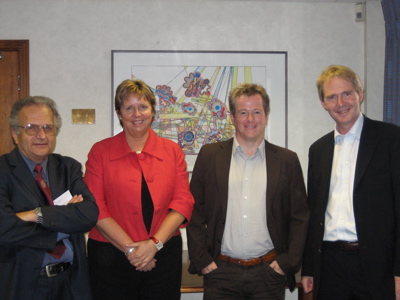Interactive Empiricism: The Philosopher in the Machine

Left to right: Igor Aleksander, Wendy Hall, Ron Chrisley, Nigel Shadbolt. Photo: unknown.
On July 11th, 2007, I gave an invited lecture as part of a Royal Academy of Engineering seminar entitled: "AI and IT: Where Philosophy and Engineering Meet", itself a part of their Philosophy of Engineering series. I elaborated on ideas that I have only hinted at before in print, most notably at the end of the paper "Embodied Artificial Intelligence" (can't provide a link to it here or it will screw up my feed - ugh).
Abstract: Although an understanding of the importance of engineering for philosophy can be traced back at least as far as Giambattista Vico's slogan "Verum Ipsum Factum" ("what is made is what is true"), the landmark elaboration of this understanding in the context of artificial intelligence (AI) is Aaron Sloman's The Computer Revolution in Philosophy. Using the key findings of that work as a foundation, I will argue that in the field of AI, the mutual benefits of philosophy and engineering extend well beyond the general salutary interdependence of theory and practice. Interactive empiricism will be introduced as the claim that key breakthroughs in both building and philosophically understanding consciousness will result from the theorist/philosopher being an integrated causal component of the system being designed. Recent work in AI will be used to support this claim.
As it happens, I didn't mention Sloman's work in the talk at all, and barely mentioned Vico.
Media:


